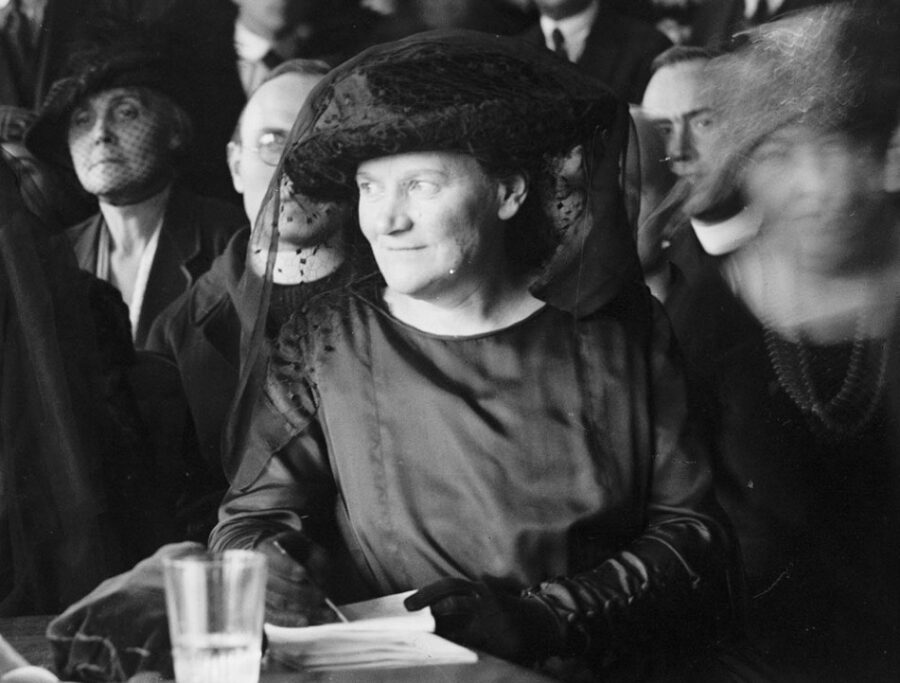
Kieran’s Our City, Our Town Article,
Cork Independent, 10 November 2022
Journeys to an Irish Free State: Mary MacSwiney’s Hunger Strike
November 1922 coincided with the hunger strike of Mary MacSwiney as part of her continued protest at the Treaty and as her part in the Irish Civil War. After Mary’s re-election to Dáil Éireann in June 1922 she abstained from the political institution. She fought the Irish Civil War making regular speeches in the public realm but remained in a non-combatant role.
On 4 November 1922, Mary was arrested at the home of Nell Ryan at 40 Herbert Park, Ballsbridge, Dublin. Her premises were raided by National Army soldiers. She was interned at Mountjoy Gaol where she immediately went on hunger strike. At once Mary’s national political presence attracted attention. The gaol doctor, Dr O’Connor, asked for a waterbed for her comfort. Nevertheless, during the hunger strike Mary refused doctor visits. Just outside the prison walls Cumann na mBan members held vigils demonstrating against Mary’s internment and the internment of others like her.
The Cork Examiner reported on 9 November 1922: “Dublin, Wednesday 8 December 1922 – Miss Mary MacSwiney, sister of Terence MacSwiney, late Lord Mayor of Cork, entered today on her fifth day of hunger strike in Mountjoy Prison. She has been joined since Monday in the hunger strike by four other prisoners, Madame O’Rahilly, widow of the [Michael Joseph] The O’Rahilly, Mrs Humphries his sister and her daughter, Sheila, and Miss Honor Murphy”.
In connection with messages of protest received by President WT Cosgrave of the Irish Provisional Government from the American Association for the Recognition of the Irish Republic referring to the arrest and detention in prison of Miss Mary MacSwiney, TD, the Government Publicity Department issued a statement in the evening of 3 November. President Cosgrave wrote about returning with General Richard Mulcahy from a tour of the Dublin hospitals where he had visited seriously injured soldiers of the National Army and his thoughts upon such suffering;
“Deaths and sufferings, and a daily toll of further deaths and sufferings, are the direct consequences of the doings of people who formerly were, and still claim to be, political leaders, the consequence of the action which Mr De Valera has described as Rory O’Connor’s unfortunate repudiation of the Dáil, which I (De Valera) was so foolish as to defend”.
“Mr De Valera, Miss MacSwiney, and their associates, far from wishing to make amends for what they refer to as their ‘foolishness’, show that they intend to go on being foolish, even at the terrible cost of Irish blood and suffering. They are responsible for the shedding of blood in Ireland, and for its continuance cannot themselves claim immunity. We, on whom the Irish people have placed the responsibility of asserting their authority, will not allow the discharge of that duty to the nation to be hampered by the consideration of any individuals, be they whom they may”.
At a Cork Harbour Board meeting in mid-November 1922 the chairman received a delegation of ladies (Mrs Sheehan, Mrs K Riordan, and Miss Sheehan) who read a document asking for the release of Mary MacSwiney; “We the constituents of Miss MacSwiney ask the Provisional Government, as an not of chivalry, to forthwith release Miss MacSwiney, hoping by this kindly act to alleviate bitterness between Irishmen will help towards the cessation of fratricidal strife, which is slowly destroying our country”.
Continuing the Chairman said he appreciated the manner in which the document had been worded. He described it as having no party bitterness in it, and he hoped that as they were celebrating the second anniversary of Terence MacSwiney’s death, which had evoked such world-wide admiration, he hoped the Government would act on it.
Board member and member of Cork Corporation Sir John Scott, in proposing the adoption of the resolution, said that there were times in the “affairs of men and women when politics had to be put aside”, and he thought that was one of them. He regretted that Miss MacSwiney had been arrested, because he thought that action was an “error of judgment”, and he had no hesitation in asking that she be released Mr Barry Egan seconded.
Mr T J Murphy wished to be associated with the request. He noted that Miss MacSwiney was a member of their Board and TD for the city, and he did not think it would hurt the Provisional Government to grant her release. He thought, in fact, it would be much better for the Provisional Government if they did so. Mr O’Brien also supported the resolution. He did not think it would serve any patriotic purpose to keep Miss MacSwiney in prison. The Chairman said he supposed there was no objection whatever to passing the resolution. The motion was formally passed and the deputation withdrew.
Members of Cork Corporation also called for Mary’s release as well as the Cork Worker’s Council. In addition on the twentieth day of the hunger strike, Mary’s sister Annie MacSwiney, who had been fasting outside the gaol for a week, was removed in a very weak state to a private nursing home in Eccles Street, Dublin. Annie was determined to fast until she was admitted to the gaol to see her sister.
Beyond the twentieth day of Mary’s hunger strike, her condition was grave and she was given the Last Rites by a Roman Catholic priest. On the 24th day though the Government were not prepared to let hunger strikers die, and she was released.
In early April 1923 Mary was arrested again and taken to Kilmainham Gaol and was released after 19 days of hunger strike.
Caption:
1176a. Mary MacSwiney TD, 1921 (Source: Houses of the Oireachtas Archive).